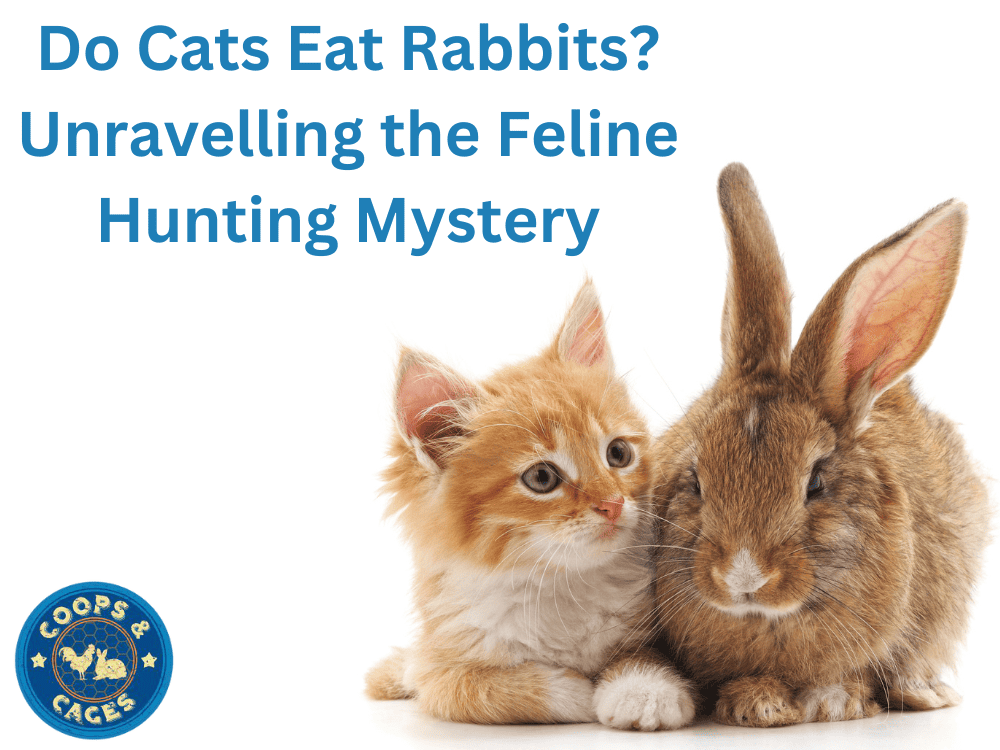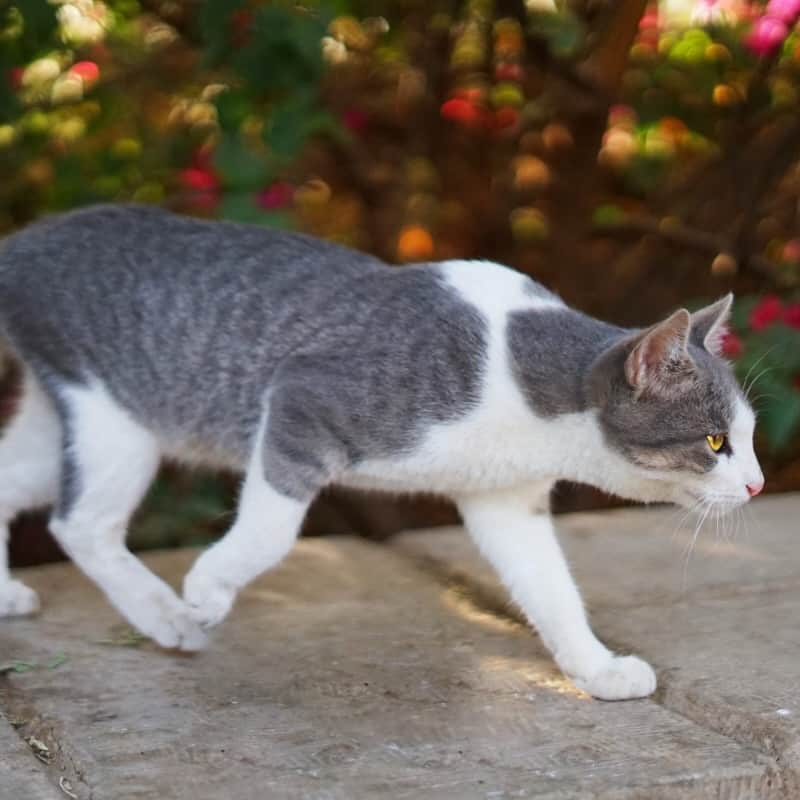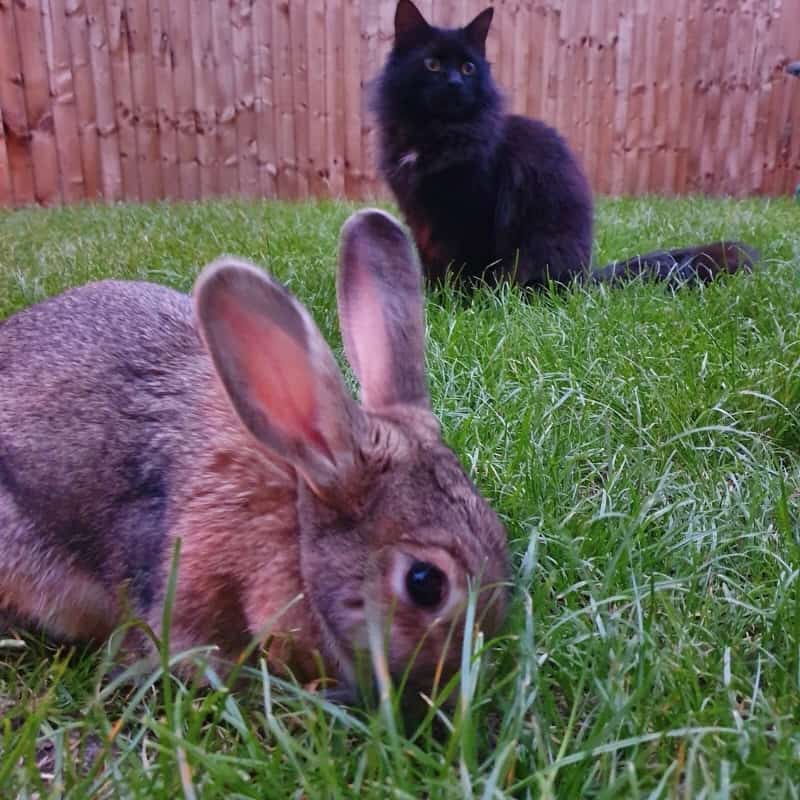Cats, FAQ's, How To Do Things
Do Cats Eat Rabbits? Unravelling the Feline Hunting Mystery
Do cats eat rabbits? It’s an interesting query, don’t you think? A complex blend of feline behaviour and the circle of life.
Let me tell you, our domestic furballs aren’t as different from their wild cousins as we might think. They share that same predatory instinct which can sometimes be directed towards creatures like rabbits.
Let’s take a look at the natural diet of cats and how they differ between our homebound pets and those roaming in the wild. We will also chat about whether bunnies fall on a cat’s menu list often or not.
Stick around and learn do cats eat rabbits, as well as some practical tips if you need help keeping your kitty away from pet rabbits too!
- Understanding the Natural Diet of Cats
- Domestic Cats vs. Wild Cats: Dietary Differences
- Rabbits as Potential Prey for Cats
- The Predatory Behaviour of Cats Explained
- Health Implications for Cats Eating Rabbits
- How Often Do Cats Hunt and Eat Rabbits?
- How to Discourage Your Cat from Hunting Rabbits
- Impact of Cat Predation on Rabbit Populations
- FAQs in Relation to Do Cats Eat Rabbits
- Jordan’s Wrap
Understanding the Natural Diet of Cats
Cats have adapted over time to feed primarily on the flesh of small animals such as mice, birds and insects. These creatures give cats all the nutrients they require.
Their sharp teeth and claws allow them to catch and kill their food efficiently.
Plus, cats have an extraordinary ability to digest raw meat without getting sick because their digestive systems contain enzymes that can handle bacteria found in raw foods.
In nature, a cat’s diet doesn’t consist solely of muscle meat; they also eat bones for calcium and organ meats which are rich in essential vitamins.
Domestic Cats vs. Wild Cats: Dietary Differences
Cats, both house-dwelling and untamed, are renowned for their flesh-eating habits. However, the differences in their diets are stark due to human intervention.
Wild cats typically prey on small mammals, including rodents and birds. But larger species such as lynxes or bobcats might hunt rabbits too.
On the other hand, domesticated cats have a more controlled diet. This includes commercial cat food which is balanced with proteins, fats and essential nutrients they need.
Rarely would you find domestic cats hunting for live prey unless they’re outdoor pets or feral ones that still maintain some of their wild instincts.
Rabbits as Potential Prey for Cats
It’s not uncommon to wonder if our feline friends would consider rabbits as potential prey. Cats are natural predators, but does that extend to hunting and eating rabbits? This is a question often asked by pet owners who house both cats and rabbits.
The answer isn’t simple because it largely depends on factors like the cat’s size, age, and instinctual drive. Although some domestic cats might chase smaller animals out of curiosity or playfulness, their ability to successfully catch and kill a rabbit is less certain.
Coexisting peacefully can be achieved with proper training from an early age. But remember that each animal has its own temperament which could affect this outcome.
If your cat is struggling with catching prey or causing disturbances with other pets, consider the thoughtful option of investing in a cat enclosure.
Coops and Cages have a range of premium cat enclosures that provide your feline companion with the pleasure of the outdoors while ensuring their safety and minimizing potential disruptions for other animals.
The Predatory Behaviour of Cats Explained
Cats are natural hunters. Even well-fed pet cats may engage in hunting behaviour due to their strong predatory instincts.
This is not about hunger, but rather it’s tied to the cat’s evolutionary past. In the wild, felines hunt for survival and teaching kittens how to catch prey is a crucial part of their upbringing.
Whilst the majority of house cats don’t require hunting to nourish themselves, these innate actions may still occasionally come out. This could explain why some cats might target rabbits as potential prey.
Health Implications for Cats Eating Rabbits
Cats consuming rabbits can have varied health implications. While rabbit meat is rich in protein, which cats need, there’s a risk of disease transmission from wild rabbits.
Toxoplasmosis and Tularemia are two diseases that cats could potentially contract. Moreover, consumption of bones may lead to digestive issues such as blockages or tears in the digestive tract.
If your cat hunts and eats a rabbit without your knowledge, monitor them closely for any signs of illness. This behaviour also raises ethical questions about domesticated pets hunting wildlife. Therefore it’s important to discourage this where possible by providing plenty of enrichment at home.
How Often Do Cats Hunt and Eat Rabbits?
The frequency of cats hunting rabbits can vary greatly. Factors like geographical location, availability of other food sources, and the cat’s own hunting skills play a significant role.
In urban areas where small prey is scarce, domestic cats might rarely encounter rabbits. In rural or semi-rural areas with plentiful wild rabbit populations, cats are likely to hunt them.
A study by Nature shows that while birds are the most frequent victims of pet cat predation, mammals such as rabbits are also often targeted.
This doesn’t necessarily mean your feline friend will consume its catch though – sometimes they’ll bring it home as a ‘gift’.
How to Discourage Your Cat from Hunting Rabbits
If your cat’s natural hunting instincts are causing trouble with the local rabbit population, there are practical steps you can take.
Firstly, providing enough playtime can satisfy their predatory needs and distract them from real prey. You might also consider a bell for your cat’s collar. While it won’t completely stop their hunting habits, it could give rabbits an early warning system.
Last but not least, altering feeding schedules may help as well. Cats tend to hunt more when they’re hungry so adjusting meal times might just do the trick.
Impact of Cat Predation on Rabbit Populations
The predatory habits of cats can have a significant effect on rabbit populations, especially in areas where rabbits are native. Domestic and feral cats alike pose a threat to these furry creatures.
While some might think that cat predation is nature’s way of controlling the population, it can actually cause an imbalance in certain ecosystems.
For example, in Australia, where rabbits aren’t indigenous but were introduced by settlers, their numbers exploded due to lack of natural predators. But when domesticated or feral cats hunt them down excessively, this disrupts other species who rely on rabbits as part of their diet too.
Rabbits also play vital roles such as soil fertilisation and providing habitat for smaller organisms which further highlights the importance of maintaining balance between predator and prey dynamics.
FAQs In Relation To Do Cats Eat Rabbits
Do Pet Cats Kill Rabbits?
Pet cats can indeed hunt and kill rabbits, driven by their natural predatory instincts. However, the size of the rabbit may deter smaller felines.
What Happens If My Cat Eats A Rabbit?
If your cat nabs a bunny, they could get nutritional benefits but also risk ingesting parasites or disease-causing bacteria from wild prey.
Are Rabbits Safe From Cats?
Rabbits aren’t always safe around cats due to their instinctual hunting behaviour. However, certain factors like the size and agility of the rabbit can offer some protection.
Can A Cat Get Sick From Eating A Rabbit?
Cats might fall ill after scoffing down an infected bunny carrying harmful pathogens or parasites such as tularemia or tapeworms.
Jordan’s Wrap
So, there you have it, folks! We’ve unravelled the mystery around “Do cats eat rabbits”. Turns out, our furry mates are capable hunters just like their wild cousins.
Rabbits can be on a cat’s menu. Still, size and where it takes place are important considerations. Remember though, frequent rabbit hunting isn’t common for domestic cats.
We also learned that munching on bunnies could potentially affect your kitty’s health – both good and bad ways!
If you’re not keen on having your furball hunt down Mr. Rabbit, remember those practical tips we discussed to discourage them from doing so.
Lastly but importantly – remember that our feline friends’ predatory behaviour does impact local wildlife populations including rabbits. So keep an eye out!





